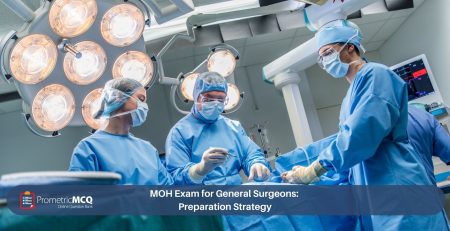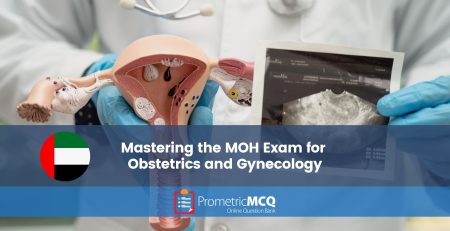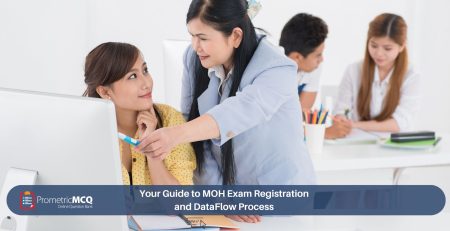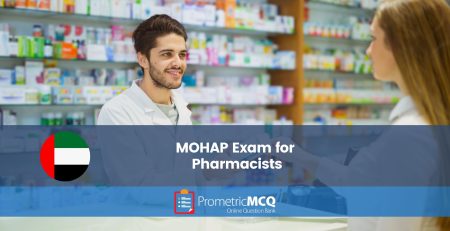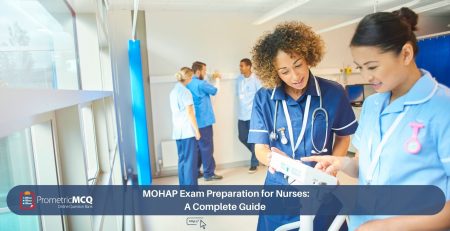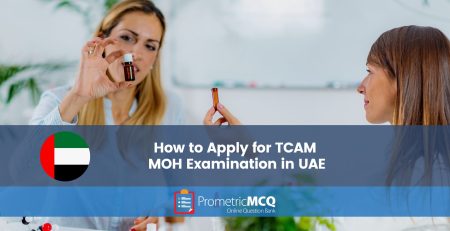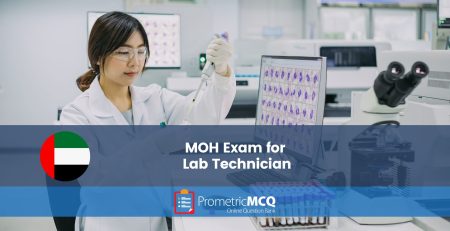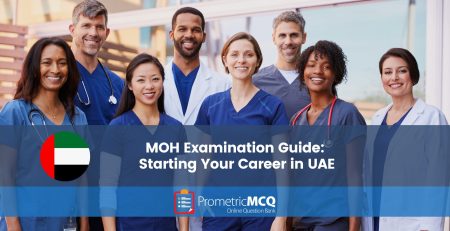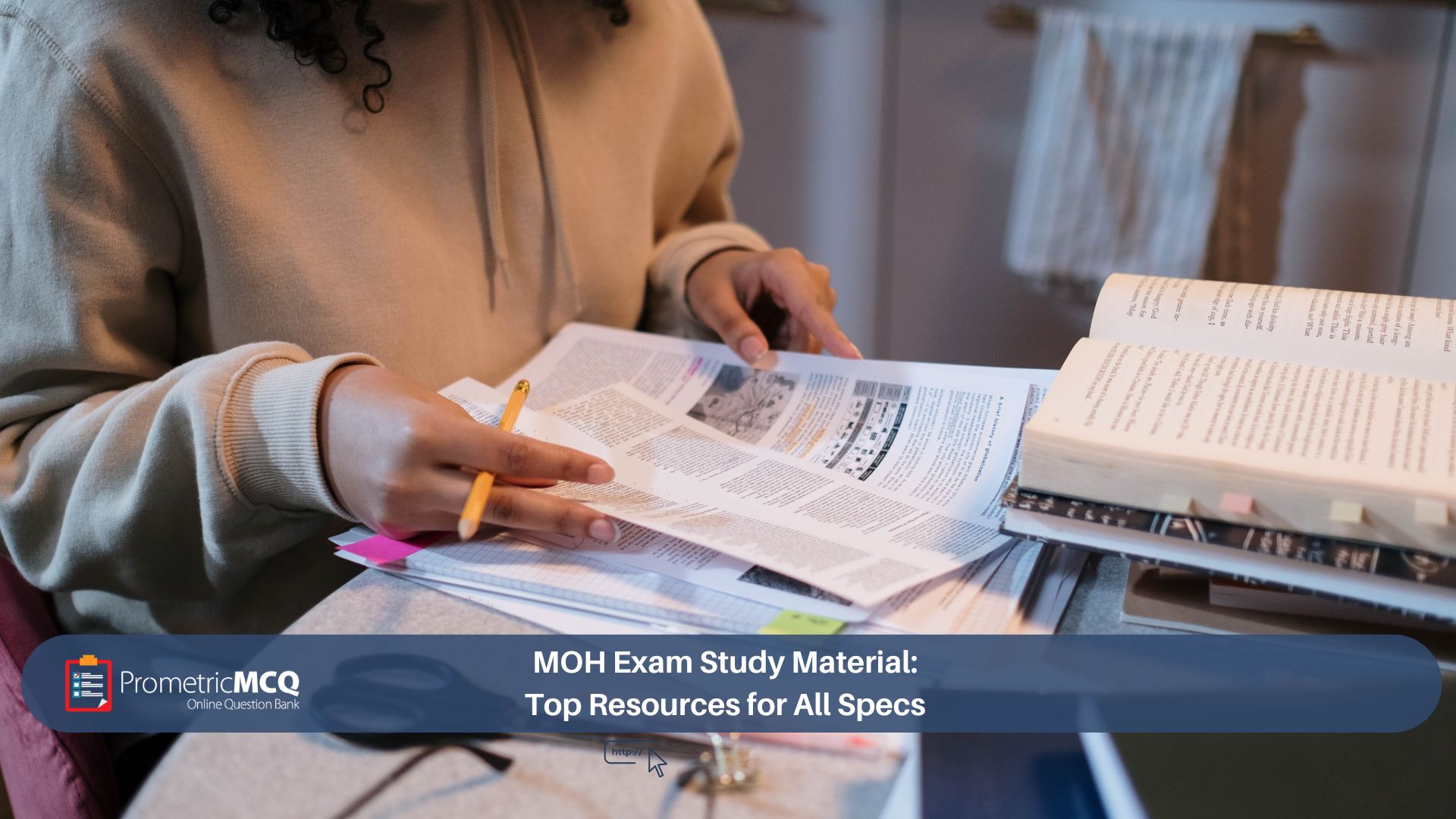
MOH Exam Study Material: Top Resources for All Specs
fatima@prometricmcq.com2025-09-15T14:39:05+00:00Table of Contents
ToggleMOH Exam Study Material: Top Resources for All Specs
The journey to obtaining a professional license from the UAE’s Ministry of Health and Prevention (MOHAP) is a marathon, not a sprint. While understanding the registration process is the first step, the core of your preparation lies in selecting and effectively utilizing the right study materials. The internet is flooded with resources, from outdated PDFs to questionable “exam dumps,” making it incredibly difficult for candidates to identify materials that are both reliable and relevant to the actual MOH Prometric exam.
Choosing the wrong study materials is a critical error that can lead to wasted time, a false sense of confidence, and ultimately, a failed exam attempt. The MOH exam is a sophisticated assessment of clinical reasoning, not rote memorization. Therefore, your study resources must reflect this, focusing on building deep conceptual understanding and providing practice with high-quality, scenario-based questions.
This ultimate 2025 guide is designed to be your trusted curator for the best MOH exam study materials across all major healthcare specializations. We will cut through the noise and provide a definitive list of top-tier resources, including essential textbooks, leading online platforms, and the single most critical tool for your success: a high-quality MCQ question bank. This is your blueprint for building a powerful and effective study arsenal. To get started on the right foot, ensure you’re familiar with the overall MOH Prometric Exam Preparation strategy.
Key Takeaways for Choosing Study Materials
- MCQ Question Banks are Non-Negotiable: This is the #1 tool for success. Active learning through practice questions is far more effective than passive reading.
- Textbooks Build Your Foundation: Use gold-standard textbooks to build a deep, unshakable understanding of core concepts. Don’t rely on summary notes alone.
- Recency Matters: Healthcare is constantly evolving. Aim to use resources and textbook editions published within the last 5 years to ensure you are studying current clinical guidelines.
- Avoid “Exam Dumps”: Memorizing supposed “leaked” questions is an ineffective and risky strategy. The MOH exam question pool is vast, and this approach fails to build the clinical reasoning skills you actually need.
- A Combined Approach is Best: The ultimate strategy combines foundational textbook reading with intensive, daily practice from a specialized MCQ question bank.
The Cornerstone of Success: High-Quality MCQ Question Banks
Before we dive into specialization-specific resources, it’s crucial to establish the single most important study tool for any MOH exam candidate: a comprehensive, well-designed MCQ question bank (QBank). The MOH exam is entirely computer-based and composed of MCQs. Therefore, your preparation must mirror the exam environment.
Why are QBanks so effective?
- Active Recall: Reading a textbook is passive. Answering an MCQ forces your brain to actively retrieve information, which is a powerful memory-enhancing technique.
- Simulates the Real Exam: Practicing with timed MCQs builds your mental stamina, improves your time management, and reduces exam-day anxiety.
- Identifies Weaknesses: A good QBank will provide performance analytics, showing you exactly which topics and sub-topics you are struggling with. This allows you to focus your study time efficiently.
- Develops Clinical Reasoning: The detailed rationales that accompany high-quality questions are a goldmine of information. They don’t just tell you the right answer; they explain the clinical logic, helping you understand *why* the other options are incorrect.
Investing in a premium, specialized QBank is not an expense; it is the single best investment you can make in your MOH exam preparation.
Top Study Resources by Specialization
Here, we break down the most recommended resources for major healthcare professions. The ideal strategy is to use the recommended textbooks for in-depth learning and supplement this with daily practice from the corresponding PrometricMCQ packages.
For General Practitioners (Doctors)
- Gold-Standard Textbooks:
- Davidson’s Principles and Practice of Medicine: An essential, comprehensive text covering all aspects of internal medicine with excellent clinical correlations.
- Kumar & Clark’s Clinical Medicine: Another cornerstone text, known for its clear writing style and practical approach to diagnosis and management.
- Oxford Handbook of Clinical Medicine: A concise yet comprehensive pocket guide perfect for quick reviews and consolidating knowledge.
- Online Resources:
- UpToDate/Medscape: While subscription-based, these are invaluable for the most current evidence-based guidelines and treatment protocols.
- Essential QBank:
- A targeted MOH General Practitioner Exam MCQs bank is crucial for practicing the broad range of topics covered in the GP exam.
For Nurses
- Gold-Standard Textbooks:
- Saunders Comprehensive Review for the NCLEX-RN Examination: Although for the NCLEX, this book is arguably the best all-in-one resource for nursing content review worldwide. Its scope and question style are highly relevant.
- Lewis’s Medical-Surgical Nursing: The definitive text for the largest portion of the MOH exam. Focus on chapters related to common chronic illnesses.
- Lippincott Manual of Nursing Practice: An excellent, practical guide for procedures, patient care, and clinical protocols.
- Pharmacology Resources:
- Create your own flashcards for major drug classes. Focus on mechanism of action, key side effects, and nursing considerations.
- Essential QBank:
- Practice is key for nurses. A dedicated MOH Nursing Exam MCQs bank will help you master prioritization and safety questions.
For Pharmacists
- Gold-Standard Textbooks:
- DiPiro’s Pharmacotherapy: A Pathophysiologic Approach: The bible of clinical pharmacy. Essential for understanding disease states and therapeutic management.
- Koda-Kimble & Young’s Applied Therapeutics: The Clinical Use of Drugs: A case-based approach that is excellent for developing clinical reasoning skills.
- The APhA Complete Review for Pharmacy: A comprehensive review book covering all major pharmacy topics.
- Critical Area of Study:
- UAE Pharmacy Law: You MUST find and study resources related to the UAE’s specific laws on dispensing, controlled substances, and pharmacy practice. This information is not in international textbooks.
- Essential QBank:
- A specialized MOH Pharmacist Exam MCQs bank is vital for practicing clinical scenarios and calculations.
For Radiography Technologists
- Gold-Standard Textbooks:
- Merrill’s Atlas of Radiographic Positioning & Procedures: The definitive resource for all positioning questions. You should know this book inside and out.
- Bushong’s Radiologic Science for Technologists: Physics, Biology, and Protection: The essential text for understanding the physics of x-ray production, equipment, and radiation biology.
- Essential QBank:
- Success in the radiography exam is impossible without extensive practice. A dedicated MOH Radiographer Exam MCQs bank is the best tool to master positioning and physics questions.
Frequently Asked Questions (FAQs) on MOH Study Materials
While a QBank is the most important tool, it’s most effective when used with a foundational textbook. If you get a question wrong, the QBank rationale will explain it, but you should then go back to your textbook to read about that topic in-depth to solidify your understanding. A QBank helps you find your weak areas; a textbook helps you fix them.
Clinical guidelines and practices evolve. You should aim to use the latest or second-latest edition of any major textbook. A good rule of thumb is to use materials published within the last 5 years to ensure the information, especially regarding treatment and pharmacology, is current.
This can be challenging. The best source is the official MOHAP website itself, which may have circulars or publications. For pharmacists, this is particularly critical. Networking with professionals already working in the UAE can also be a valuable source of information on local practices.
You should be extremely cautious. Many free resources are outdated, contain incorrect information, or are simply collections of recalled questions without verified answers or rationales. Relying on these can be detrimental. It is always better to invest in a reputable, peer-reviewed resource like a well-known textbook or a professional QBank service.
Look for a QBank that is specifically tailored to the MOH (or at least Middle East Prometric) exams. It should offer a large number of questions, detailed explanations for both right and wrong answers, timed exam simulations, and performance tracking to help you identify your weak areas.
For all specializations, pharmacology is a major topic. The most effective method is a multi-pronged approach: 1) Read the relevant chapters in a core textbook (like Lippincott for nurses/docs, DiPiro for pharmacists). 2) Create your own summary notes or flashcards by drug class. 3) Answer hundreds of pharmacology questions in a high-quality QBank.
Very important. The MOH exam reflects a high international standard of care. You should be familiar with major guidelines from globally recognized bodies, such as the American Heart Association (AHA) for cardiology, or the World Health Organization (WHO) for public health standards. The WHO’s publications database is a great source for global health standards.
This depends on your timeline and baseline knowledge. A common recommendation is 2-4 hours of focused study per day for 2-3 months. Consistency is more important than cramming. A sustainable daily schedule is far more effective than trying to study for 10 hours on a weekend.
A good balance is the 60/40 rule. Spend about 40% of your time on content review (reading textbooks, watching videos) and 60% of your time on active learning (answering and reviewing QBank questions). As you get closer to your exam date, this should shift even more towards question practice.
It requires discipline and a smart study plan. Utilize “dead time” like your commute to listen to medical podcasts or review flashcards on your phone. Dedicate a specific, non-negotiable block of time each day for studying, even if it’s just 90 minutes. Use a QBank’s mobile app to do short quizzes during breaks. Planning your study in advance is key to staying on track.
Conclusion: Building Your Arsenal for Success
Passing the MOH exam is a direct result of the quality and focus of your preparation. There are no shortcuts to success. The formula is simple but requires dedication: build a strong, foundational knowledge base using trusted textbooks and then relentlessly hone your test-taking skills and clinical reasoning with a high-quality, specialized MCQ question bank. By investing in the right resources and committing to a structured study plan, you are not just preparing to pass a test; you are preparing to be a competent and confident healthcare professional in the UAE.
You Have the Resource List. Now Get the #1 Tool for Success.
Stop passively reading and start actively learning. Our comprehensive QBank packages are the gold standard for MOH exam preparation, tailored to your specific specialty to guarantee you are ready for exam day.

